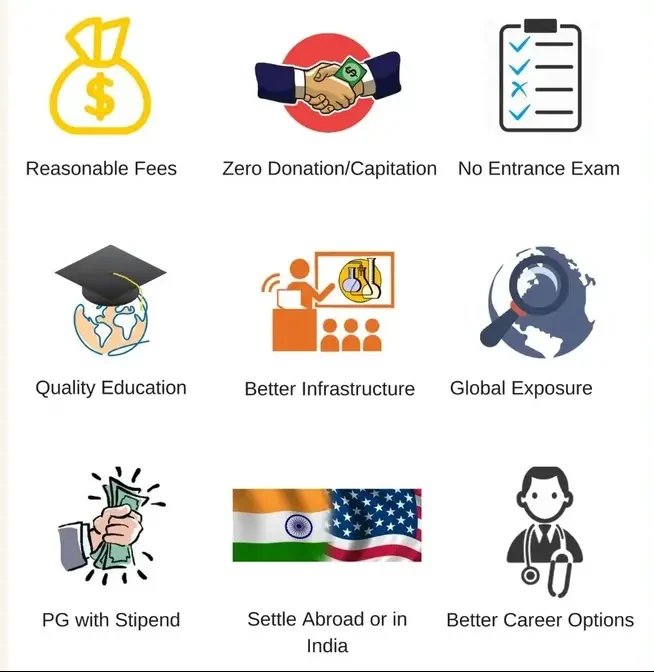
MBBS Abroad Pros and Cons
MBBS aspirants have preferred to study abroad in recent days due to global exposure and quality education at affordable cost. MBBS Overseas education is preferred by most Indian students because of the low availability of seats, the high cost of study in private medical universities, and many other reasons. They can check the Pros and Cons of studying abroad before they opt to study MBBS abroad.
Pros and Cons of Studying MBBS Abroad
Before deciding to study MBBS abroad, check the pros and cons thoroughly. So that one can decide which is the better step for the future.
MBBS Abroad: Advantages
Here are some reasons why you should think about studying MBBS abroad
Modern Technology:
Abroad colleges use advanced technology to provide high-quality education, including 3D learning tools.
Excellent Facilities:
Foreign institutions offer top-notch facilities and degrees recognized worldwide. They prioritize the safety and well-being of international students.
Affordable:
The overall cost of the medical course and living expenses abroad can be affordable, depending on the country you choose.
Global Exposure:
Studying abroad exposes students to different cultures and the latest medical practices, enriching their experience.
More Seats:
Unlike India, where medical seats are limited and expensive, foreign universities offer plenty of spots for international students.
No Entrance Exam:
Many foreign universities offer admission based on your 12th-grade performance, without requiring an entrance exam.
No Donation:
While private Indian colleges demand hefty donations, foreign universities don’t have such additional fees, keeping costs reasonable.
Objective Exam Pattern:
Foreign medical universities often use objective-based exams, promoting a deep understanding of subjects.
Case Study Learning:
Many foreign medical colleges focus on case studies and practical learning, providing valuable hands-on experience.
Financial Assistance:
Various scholarships and financial aid are available from universities and organizations to attract international students.
Higher ROI:
Studying abroad opens up opportunities to practice medicine in other countries, potentially leading to higher earnings and returns on investment.
MBBS Abroad: Disadvantages
Here are some drawbacks or challenges you might face while studying MBBS abroad.
Language Barrier:
Some popular destinations like China, Russia, Poland, and Ukraine might not use English in their everyday life. This can be challenging for Indian students who don’t speak the local language, even though universities might offer English programs.
Risk of Fraudulent Universities:
While there are many good options, there are also fraudulent universities that don’t meet the necessary standards. Students need to be cautious and choose reputable institutions approved by the Medical Council of India (MCI/NMC).
Various Academic Standards:
Different countries have unique educational systems and medical procedures, so it’s crucial to research the curriculum and academic standards of the university you’re applying to.
NMC Screening Test:
If you plan to practice medicine in India after studying abroad, you’ll need to pass the MCI/NMC-approved Foreign Medical Graduates Examination (FMGE). Some Indian students find this test challenging.
Extreme Climatic Conditions:
Some places abroad may have extreme climates, making it difficult for Indian students to adapt. It’s essential to choose a university in a location with a climate similar to what you’re comfortable with.
Internship Training Period:
During internships at hospitals abroad, international students might not be allowed to directly interact with patients. Instead, their training might be limited to observation, which can impact practical experience.






